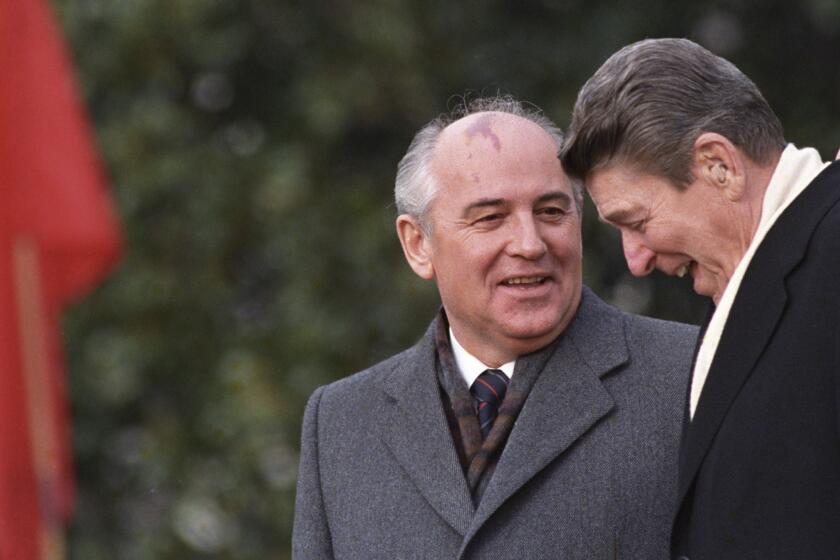More than healthcare riding on Thursday’s summit
- Share via
Reporting from Washington — The healthcare summit that convenes Thursday in Washington has emerged as a high-stakes gambit for President Obama and opposing Republican lawmakers, carrying risks for both sides that could not only alter the outcome of the healthcare debate but also November’s midterm elections.
By this point in the calendar, the White House had thought its healthcare overhaul would be completed, allowing Obama to swivel to the near 10% unemployment rate that has Americans so unnerved. Republicans had hoped the plan would be dead -- a casualty of the Democrats’ loss last month of the 60-vote Senate margin needed to end filibusters.
Yet both sides will now debate healthcare anew. And the summit, while containing undeniable elements of theater, carries major implications that could change the political landscape.
Obama will preside over the meeting at a moment when Democrats seem to be regrouping after Republican Scott Brown’s victory in the Massachusetts Senate race -- the election that cost them their 60-vote, filibuster-proof majority.
Few leaders in either party see much possibility that the summit will break the partisan impasse and produce a consensus for a healthcare bill.
But that only raises the stakes.
A compelling performance from the president before a national TV audience could rally public opinion, which might lock down the votes of some liberal and conservative Democrats who’ve wavered in their willingness to endorse the Senate-passed healthcare bill. (Endorsing it is the only viable way to avoid a high-profile failure on their top domestic priority, Democratic leaders think.)
A weak performance, on the other hand, or a public display of partisan bickering or sloganeering by congressional Democrats could send prospects for healthcare and the party’s political fortunes plunging.
Republicans, meantime, are expected to press their argument that Obama should throw out his overhaul proposal and start from scratch -- something the White House has indicated it won’t do.
Rep. John Kline (R-Minn.), who will take part in the summit, said: “The president has already set the stage poorly because he has taken the Senate bill, which is 2,700 pages of legislative text, put out 11 pages of his own, and said, ‘This is what we’re going to talk about.’ And our position is, ‘No. Let’s don’t start with dueling pieces of legislation. Let’s start with our own ideas and see what we can agree on.’ ”
Republicans have little political incentive to cooperate -- except to avoid appearing overly partisan or obstructionist.
A new poll by Republican pollster Bill McInturff suggests that opposing the plan could pay dividends for the GOP in the November elections. Opposition to the healthcare plan is particularly pronounced among independent voters, conservative “tea party” supporters and those keenly interested in the midterm elections, according to the survey.
By focusing on parts of the overhaul that Americans don’t like -- the secretive, deal-driven way the bill moved through Congress, for example -- Republicans could undermine public support in ways that doom the legislation’s prospects.
That’s a result Democrats need to avoid because, they say, healthcare is unavoidably bound up with the Democrats’ chances in November.
“Failure to pass a bill of any kind presents real problems for us in the midterms,” Mark Mellman, a Democratic strategist, said in an interview.
“If it doesn’t pass, the message to the American people is that Democrats can’t get anything done, can’t govern and can’t deliver on promises to the American public. And that’s a bad platform on which to be running for reelection.”
In Obama, though, Democrats believe they have an able advocate. At the meeting with House Republicans in Baltimore last month, Obama showed he can hold his own in the kind of freewheeling policy discussion that Thursday’s summit will provide.
Celinda Lake, a Democratic pollster, said: “The potential peril is for [Republicans] to take one or two things that are less popular and define that plan that way. So it will be a struggle back and forth about who defines the plan. But I think [Obama] is the odds-on favorite to win that fight because he has the bully pulpit and is leading the summit.”
Obama will make an opening statement at the summit and also moderate the discussion. The talks will take place from 10 a.m. to 4 p.m. Eastern time and will be shown on C-SPAN3. They will also be streamed live on the White House website, www.whitehouse.gov “> www.whitehouse.gov .
Democrats are working out lines of argument. Obama could ask Republicans whether they support the notion that insurers must not discriminate against people based on preexisting conditions. Republicans would be hard-pressed to say no.
Following that logic, all Americans must be in the insurance pool. And if they are in the pool, those who can’t afford coverage must be given subsidies. By demonstrating how the various pieces of the Democratic proposal are interlocked, Obama can try to show that Republican opposition is unreasonable, some Democrats say.
“The president can ask, ‘Are you with us on prohibiting health companies from discriminating based on preexisting conditions? If we can agree on that, what’s the solution?’ It only puts them on the spot if they don’t have a solution,” Rep. Chris Van Hollen (D-Md.), chairman of the Democratic Congressional Campaign Committee, said in an interview.
No matter how the meeting plays out, the daylong focus on healthcare isn’t what the White House had wanted at this stage. They’d rather be talking about jobs. So the very fact of the meeting is, in some sense, a Republican victory.
Rob Stutzman, a Republican strategist, said: “They’re putting the wrong item on the menu. The country has an appetite for red meat and potatoes, and they’re still serving baked fish.”
peter.nicholas@ latimes.com
More to Read
Get the L.A. Times Politics newsletter
Deeply reported insights into legislation, politics and policy from Sacramento, Washington and beyond. In your inbox twice per week.
You may occasionally receive promotional content from the Los Angeles Times.










